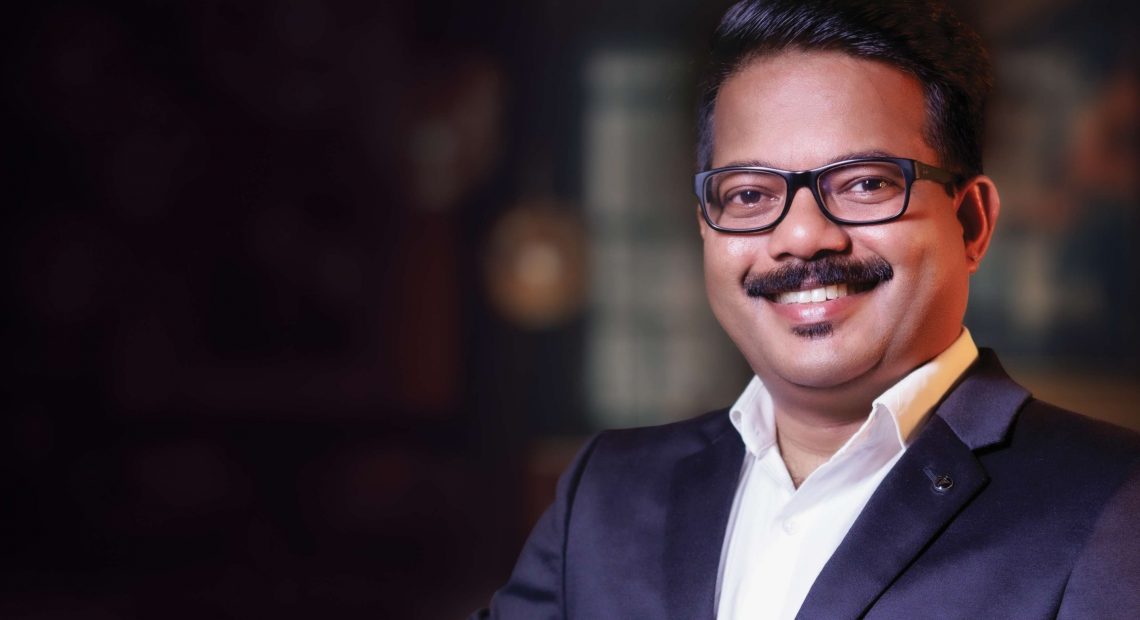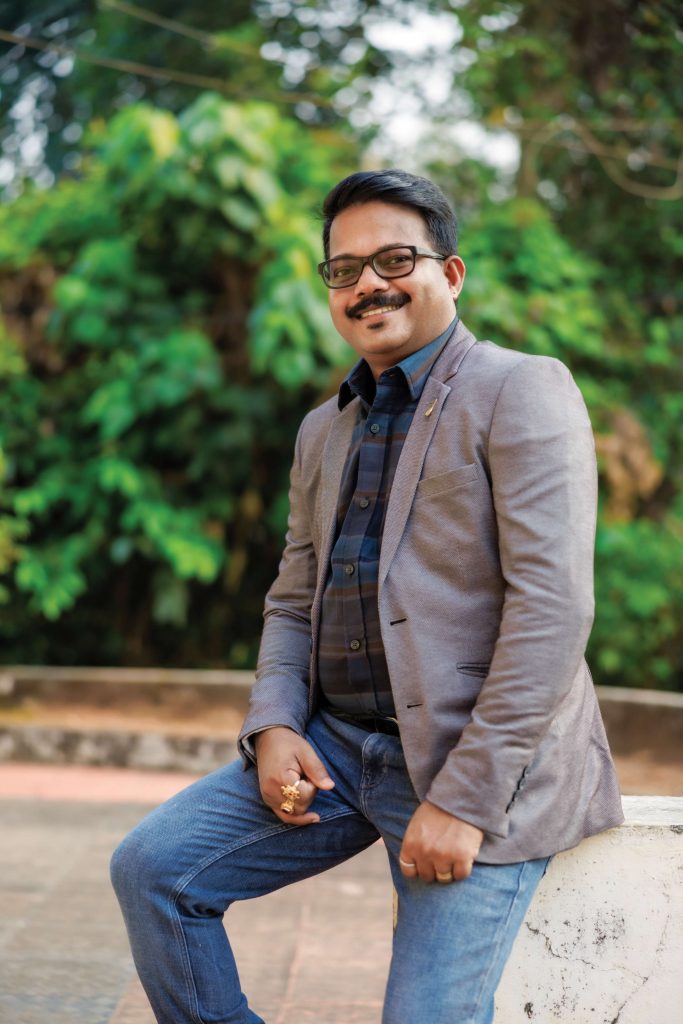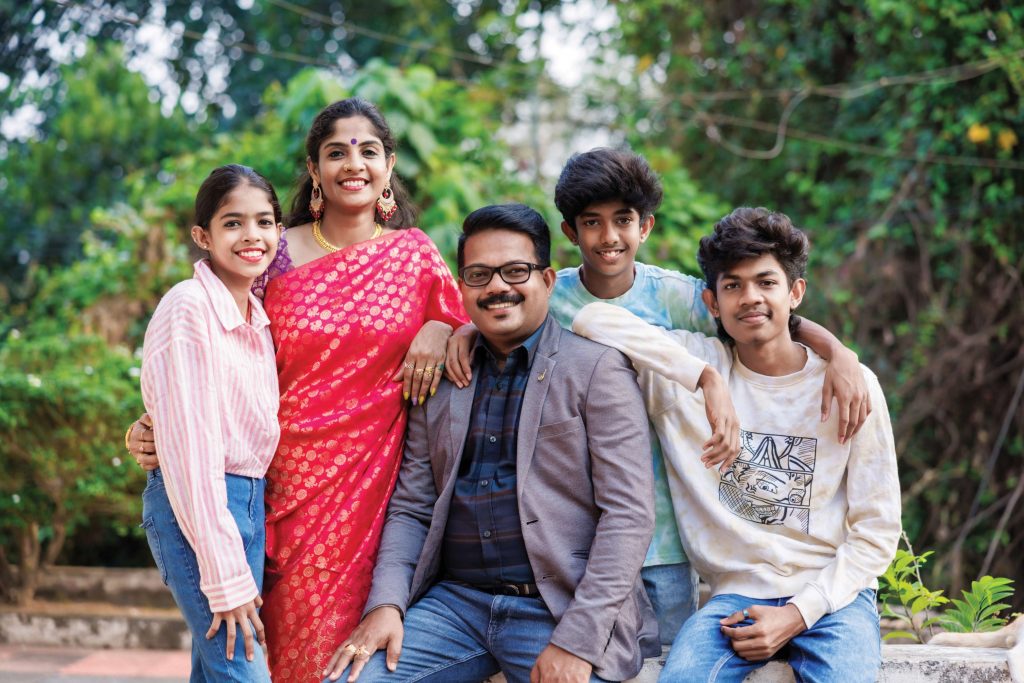Balancing Justice and Compassion: The Journey of Advocate AP Vasavan

In the realm of law, where the scales of justice often tip between legal technicalities and human compassion, Advocate AP Vasavan of the High Court of Kerala stands out as a beacon of integrity, fairness, and empathy. With a career spanning 23 years, Vasavan has carved a niche for himself as a legal luminary who places humanity, justice, and honesty on par with the letter of the law. AP Vasavan’s remarkable journey, marked by over 10,000 cases, including high-profile sessions and POCSO cases, underscores his unwavering commitment to truth and fairness.
Early Life and Education:
AP Vasavan’s early life in Palakkal, Thrissur district, shaped his values and set the foundation for his illustrious career. Born to Prabhakaran and Radha, he is the eldest of three children. After completing his schooling and college education in his hometown, AP Vasavan pursued a degree in law from BMS Law College in Bengaluru. It was his father’s dream that he enter the legal profession, a desire that guided him towards a career in law.

Career Highlights:
Since embarking on his legal journey in 2001, AP Vasavan has been a steadfast advocate for the marginalized and downtrodden, striving to ensure that justice is not only served but also perceived to be served. One of the hallmarks of AP Vasavan’s career is his ability to navigate complex and challenging cases with unwavering determination and integrity. Among these, the Thrissur POCSO case stands out as a testament to his dedication to uncovering the truth. Despite the odds stacked against his client, AP Vasavan’s perseverance and commitment to justice ultimately led to the exoneration of the accused, shedding light on the importance of diligence and determination in the pursuit of truth.
In addition to his legal practice, AP Vasavan is a vocal advocate for reform within the judicial system. He believes that the introduction of new statutes, such as the Bharatiya Nagarik Suraksha Samhita, Bharatiya Nyaya Sanhita, and Bharatiya Sakshya Adhiniyam, will significantly enhance the efficiency and effectiveness of the legal system. Furthermore, he advocates for the expansion of privacy laws to protect vulnerable individuals, particularly in cases involving sexual assault and harassment.
Opinions on Legal Education:
Restructuring the legal education system solely within Kerala is not practical since laws are uniform across India and not limited to any specific state. Historically, Kerala lacked private legal education institutions, creating a gap in its educational landscape. However, this gap has been addressed with the emergence of private sector institutions, offering students the freedom to choose their preferred legal studies institutions.
Despite these improvements, the legal education system still has several shortcomings. For aspiring lawyers, understanding court procedures requires more than just theoretical knowledge; it demands practical insight into current practices. Similar to other professional courses, legal studies should emphasize practical experience alongside theoretical learning.
India’s extensive legal framework, comprising over 3000 Acts, makes it unrealistic for law students to master every law entirely. Thus, the modern educational approach should focus on imparting knowledge of key laws and practical skills for navigating legal challenges. While my own legal education lacked a strong emphasis on practical application, there has been a noticeable shift towards integrating practical elements into the curriculum. Emphasizing hands-on learning and practical training within legal studies would represent a significant advancement.
Qualities of a Good Lawyer:
To succeed in the legal profession, a lawyer must possess several essential qualities. Firstly, a comprehensive understanding of the law is paramount, along with staying abreast of the latest judgments from the High Court and Supreme Court, as well as any legislative updates. Secondly, integrity and unwavering honesty towards clients are indispensable virtues. Thirdly, a diligent approach to case preparation is essential, involving thorough research and consultation with experts on complex legal matters.
Unfortunately, there has been a troubling trend of prioritizing financial gain over ethical principles in recent times. However, drawing from my 23 years of experience in the legal field, I advocate for a steadfast commitment to honesty and diligence in one’s practice, as financial success naturally follows from maintaining professional integrity. By adhering to these principles, issues such as corruption and favoritism can be significantly reduced.
Furthermore, conducting legal proceedings in public rather than private spaces contributes to upholding the principles of transparency and fairness in the legal system. By ensuring that legal processes are accessible to all and conducted openly, trust and confidence in the judicial system can be strengthened.
Kerala High Court’s Landmark Ruling
In a significant ruling by the esteemed Kerala High Court, a case unfolded where a father accused the mother of sexually abusing their child. Presiding over the matter, Judge Shircy not only granted bail to the mother but also mandated a specialized team to conduct an investigation. This proactive step, under the High Court’s supervision, ultimately uncovered the mother’s innocence and revealed the father’s concocted allegations.
This case stands as a poignant illustration of the misuse of the POCSO Act, shedding light on the potential for revealing truth amidst unfounded accusations. It emphasizes the imperative of holding individuals accountable for baseless claims, ensuring the integrity of the legal system. However, it also invites contemplation on the appropriateness of judicial intervention in certain societal matters, underscoring the nuanced balance between judicial oversight and the autonomy of other societal institutions.

Reflections on Legal Mercy and Reform
In the case of Govindachami, the Supreme Court’s decision to commute his death sentence to a lesser punishment showcases an instance of legal mercy. Discussions surrounding his transformation during his time in prison have been sparked, emphasizing the complexities within the legal system. However, it’s crucial to recognize that the primary aim of the legal system is to ensure that severe crimes receive appropriate sanctions.
He firmly believes that India’s legal framework stands among the most precise globally and is poised for further improvement through ongoing reforms. The guiding principle of our judiciary is to prevent the wrongful punishment of the innocent, even if it means that the guilty might go unpunished. This doctrine is internationally recognized and upheld.
It would be inaccurate to suggest that the Indian legal system is inherently flawed. Like any system, it is subject to continual improvements. Originating from British legal practices, India’s legal system has served effectively for centuries. Yet, to address contemporary challenges, it requires updates and reforms. The introduction of new legal reforms holds promise in enhancing the effectiveness and fairness of the system
Challenging Perceptions in Legal Proceedings
Our understanding of legal outcomes is often shaped by media reports, which may not offer a complete or accurate portrayal of the case at hand. Take, for instance, the situation involving actor Dileep. My insight into the details surpasses the media’s depiction, indicating that his arrest and continued detention may diverge from the widely circulated narrative.
Similarly, in the Highrich case garnering media attention, reports allege fraud amounting to Rs 1,200 crores, with Rs 600 crore frozen in accounts. However, upon closer examination, no client has filed a complaint, suggesting a disconnect between media claims and actual circumstances.
Another striking example is the case involving a bishop accused of rape. Despite media reports, a review of the case file and judgment reveals inaccuracies, ultimately leading to the bishop’s innocence.
These instances underscore the importance of basing legal judgments on case-specific details rather than being influenced by potentially misleading media representations.
Strategies for Timely Resolutions
One of the most pressing challenges within our legal system is the prolonged duration of case resolutions. Addressing this issue requires comprehensive reforms within the legal framework. Ongoing and forthcoming reforms in criminal and civil law aim to tackle this issue head-on. Initiatives are already in motion to expedite cases involving non-residents, and he advocate for a more aggressive expansion of Lok Adalats and Mediation Centers.
With the introduction of new legislation, disputes between individuals can be resolved through arbitration by mutually agreed-upon arbitrators or legally recognized mediators. This approach has the potential to significantly reduce the caseload in courts by encouraging resolution before escalating to formal court settings.
Regarding the pace of legal proceedings, the current system’s requirement for the submission of a counterclaim within 30 days of filing a suit seems reasonable for organizing case documents. However, compared to this, responses to RTI requests alone can take over 30 days, indicating the logistical and technical complexities involved in expediting case resolutions.
Furthermore, it’s crucial to acknowledge the rights of all parties involved in a legal matter. Defendants must have the opportunity to defend themselves adequately. Rushing judgment could deprive defendants of this chance, necessitating time for preparation and submission of relevant documents.
Presently, delays do not appear to stem from intentional stalling. To meet the growing need for legal adjudication, a slight increase in the number of courts, alongside bolstering Dispute Resolution Centers and Adalats, could lead to a reduction in the backlog of cases.
The Kerala High Court’s Social Advocacy
The Kerala High Court has emerged as a proactive force in reshaping societal norms and addressing contemporary social issues. With remarkable responsiveness, the court swiftly intervenes in matters directly impacting the public, demonstrating a keen awareness of pressing social concerns. From ensuring public safety by tackling issues like the misuse of air horns in vehicles and the lack of adequate drainage systems to prevent waterlogging, to taking decisive action against instances of political violence and murders, the court has shown a firm commitment to upholding law and order.
Beyond its traditional role, the Kerala High Court has boldly extended its influence to matters of governance, challenging undue taxation policies and advocating for the rights and interests of citizens. By basing its interventions on newspaper reports and engaging with issues that extend beyond the courtroom, the court showcases a broader perspective on justice, one that actively addresses societal dynamics and fosters a more equitable and just society for all.
Advice for Young Lawyers
Drawing from years of experience in the legal profession, he offers two essential pieces of advice to aspiring lawyers keen on upholding professional ethics. Firstly, it is imperative to master the fundamental rules of law, encompassing statutes such as the Evidence Act, IPC, CrPC, CPC, and Civil Rules of Practice. Continuous updates and familiarity with these statutes are crucial to remaining current and effective in legal practice.
Secondly, aspiring lawyers should prioritize the diligent observation of court proceedings. This involves not only accurate comprehension of legal proceedings but also appropriate action in response. Central to maintaining professional integrity is the unwavering commitment to honesty and integrity when interacting with clients. Approach every client interaction with the utmost respect and reverence, recognizing the trust placed in you as their legal representative. By adhering to these principles, young lawyers can establish a solid foundation for ethical legal practice and contribute positively to the legal profession.
Insights from Ayyappan Pillai Sir
Balancing a demanding professional career with personal life can be a daunting task, but a chance encounter with Ayyappan Pillai Sir, a revered senior lawyer, proved transformative in navigating this delicate equilibrium. His invaluable advice, shared during the rise of ubiquitous mobile phones, advocated for a simple yet profound practice: switching off my mobile device from 9 PM to 9 AM. By dedicating this time exclusively to family matters, Pillai Sir emphasized the paramount importance of nurturing relationships over the relentless pursuit of wealth and recognition. Recognizing that true fulfillment stems from meaningful connections with loved ones, Pillai Sir’s guidance resonated deeply, prompting a steadfast commitment to spending early mornings with my children, aiding them in their school preparations. This deliberate investment in family time not only fostered a profound bond and affection but also imbued life’s achievements with deeper significance.
Inspired by Pillai Sir’s wisdom, I shared this ethos with a judge grappling with the demands of a taxing case, revealing my role as a dedicated father of four. To my astonishment, the judge publicly acknowledged me as his mentor in open court, attributing the mantra I shared to the enrichment of his own family life. Despite the demands of my professional responsibilities, I maintain a firm boundary, ensuring that family life remains sacred and untainted by work-related intrusions. To this day, my family accompanies me on trips unrelated to work, but I steadfastly uphold the separation between personal and professional realms, inviting neither partners to my home nor allowing family matters to encroach upon my professional duties.
Family and Passion
At the heart of his success lies the unwavering support of his family, particularly his wife, Advocate Prasara Vasavan, who serves as a cornerstone in both his personal and professional life. Prasara’s achievements extend beyond the legal realm; she excels as an athlete, showcasing her talent in the women’s IPL cricket and emerging victorious in lawyers’ women’s shuttle tournaments. Her versatility extends further into the realms of modeling and the arts, where her prowess shines brightly. Blessed with three children—Vedit, Sahasr, and Devanshi—their family stands as a testament to the harmonious balance between career pursuits and familial responsibilities.
His journey into the legal field was not merely a career choice but a realization of a lifelong dream instilled in him by his father. His own tenure in a legal office, preceding his employment in banking, fueled his aspiration to see his eldest son follow in his footsteps. This familial legacy nurtured within him a deep-rooted passion for law, evolving over time from a childhood interest into a profound calling. Guided by his father’s aspirations, he embarked on a path in law driven by a sense of purpose and dedication to upholding justice.

